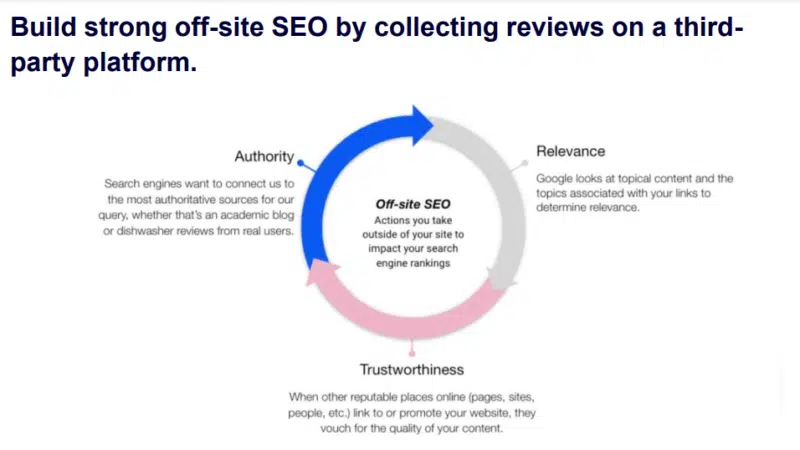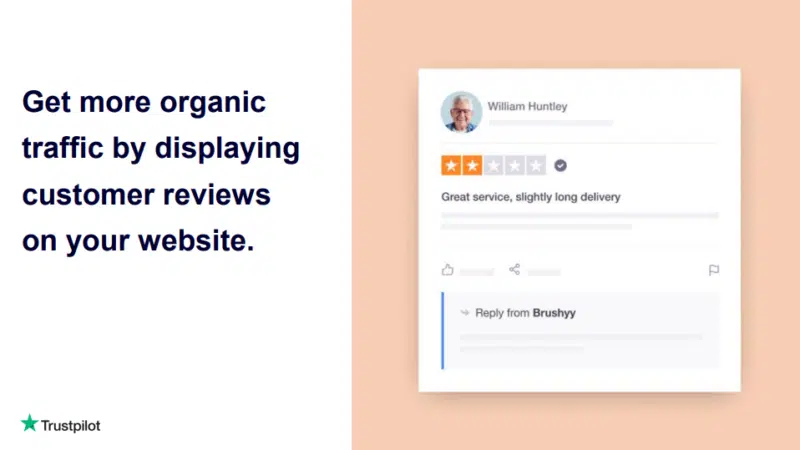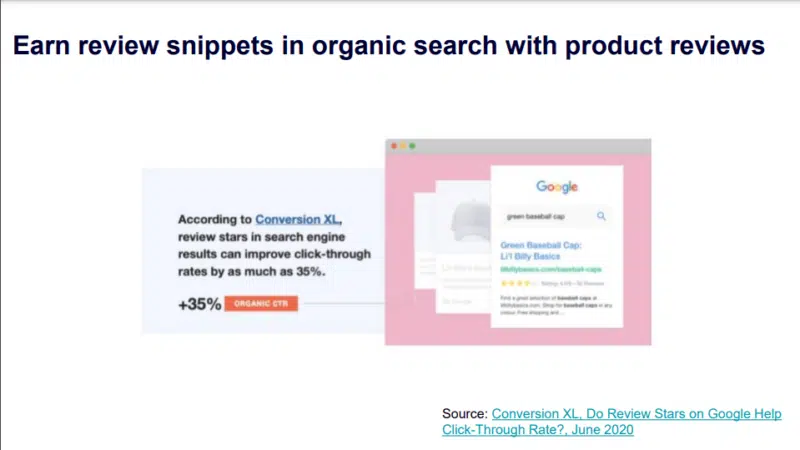How customer reviews can improve your SEO efforts
Customer reviews aren't just for show. At SMX Next, Kyra Sammis explains how marketers can use reviews to improve SEO.
Customer reviews aren’t just trust signals for your customers — they can also provide potential SEO ranking boosts when used effectively.
“They [reviews] build trust in your brand,” said Kyra Sammis, customer success manager at Trustpilot, during her session at SMX Next. “Reviews are an opportunity for anyone familiar with your brand to publicly share what they love about your products, services and customer experience. Having reviews publicly available conveys that you’re safe to do business with.”
Featuring reviews — even if they’re bad reviews — is vital for brands wanting to build customer trust in today’s competitive SEO landscape. And with 53% of all trackable website traffic coming from organic search, marketers would be wise to capture some of that share with customer reviews.
“Reviews are a powerful marketing engine in their own right — they’re a way to build trust in your brand,” she said. “You can turn that brand trust into measurable ROI through increased web traffic sales and revenue.”
Here are five ways Sammis says marketers can help boost their rankings by leveraging customer reviews.
Emphasize off-site SEO
“Off-site SEO describes any actions you take to build up a digital footprint outside of your actual website,” said Sammis. “Whether it’s building credible backlinks to your page, staying active on social media platforms or even creating a profile on a third-party review platform.”
“Most businesses have an on-page SEO strategy to help with organic search, but fewer are spending significant energy on off-page opportunities,” she added.

Google and other search engines use off-site signals to measure the relevancy, authority and trustworthiness of your brand. Reviews are some of the most consistent channels marketers can use to improve these signals.
“Google changes, but reviews are most likely here to stay,” Sammis said. “According to research from Moz.com, offsite SEO-related factors like third-party reviews carry more than 50% of the ranking factor weight. Factors like relevance, trustworthiness and authority will likely always play a role in a page’s ability to rank, and building up your online presence with reviews can help businesses crush all three of those criteria.”
Don’t neglect referral traffic
“On top of the off-page SEO benefits for your actual website, creating a profile on a third-party site can also lead to a huge spike in referral traffic,” Sammis said. “That’s because when someone searches for reviews of a brand, many of these third-party sites can wind up right at the top of the search results.”
Many third-party review sites have high authority and trust levels, enabling brand reviews to share in their high rankings. Focusing on referral traffic can bolster your SEO efforts by establishing a strong flow of visitors alongside your organic traffic.
“This could be your competitive advantage since referral traffic is so often overlooked, even though it’s a free source of qualified leads and can even improve your organic search performance,” she said.
Display reviews on your website
“Featuring customer reviews on key landing pages is easy to pull off with review widgets,” Sammis said, “And this small addition to your website can improve how often your pages show up in organic search results.”

Customer reviews are potential content sources for your web properties. By displaying them on your website, you can diversify your content while adding relevant text to your pages, both of which can contribute to improved organic page rankings.
“Reviews increase the amount of text on each page,” said Sammis. “This extra text makes your page more valuable in the eyes of Google because you’re offering them more context for what the page is about and whether it should surface for that user search query.”
“At the end of the day, Google wants to show the most reputable search results in hopes of delivering the best experience for their users,” she added.
Pay attention to star ratings
“When marketers think about star ratings and search results, paid listings usually come to mind,” Sammis said. “But most marketers don’t realize that they can also earn star ratings on their organic search listings and appeal to those savvy customers who might be less inclined to click on an ad.”

Star review ratings — the symbols displayed in the SERPs — help build searcher trust by giving them visual representations of their average ratings. This feature used to be less common, but Google now lets more site owners display them using schema markup.
“Collecting product reviews can help you qualify for review snippet in organic search,” said Sammis. “Those shiny gold stars in your listings can help attract more attention to your product pages and even improve your clickthrough rates by up to 35% in organic search.”
Make use of long-tail search queries
Reviewing the ultra-specific, long-tail keywords your customers use when searching for your products, services or brand is key to capturing your niche’s audience. But marketers can also leverage the queries used in company reviews, which are highly relevant and amplify customer voices.
“Long-tail keywords get less search traffic, but will usually have a higher conversion value as they are more specific,” Sammis said. “Thinking of every possible descriptor, use case or problem your product solves can be difficult, to say the least. Thankfully, product reviews let your customers become the copywriters, enabling them to share their own unique experience with your products in their own words.”
“The icing on the cake here is that this all happens automatically — no extra copywriting or content creation for you,” she added.
Watch the full SMX Next presentation here (registration required).
Contributing authors are invited to create content for Search Engine Land and are chosen for their expertise and contribution to the search community. Our contributors work under the oversight of the editorial staff and contributions are checked for quality and relevance to our readers. Search Engine Land is owned by Semrush. Contributor was not asked to make any direct or indirect mentions of Semrush. The opinions they express are their own.


